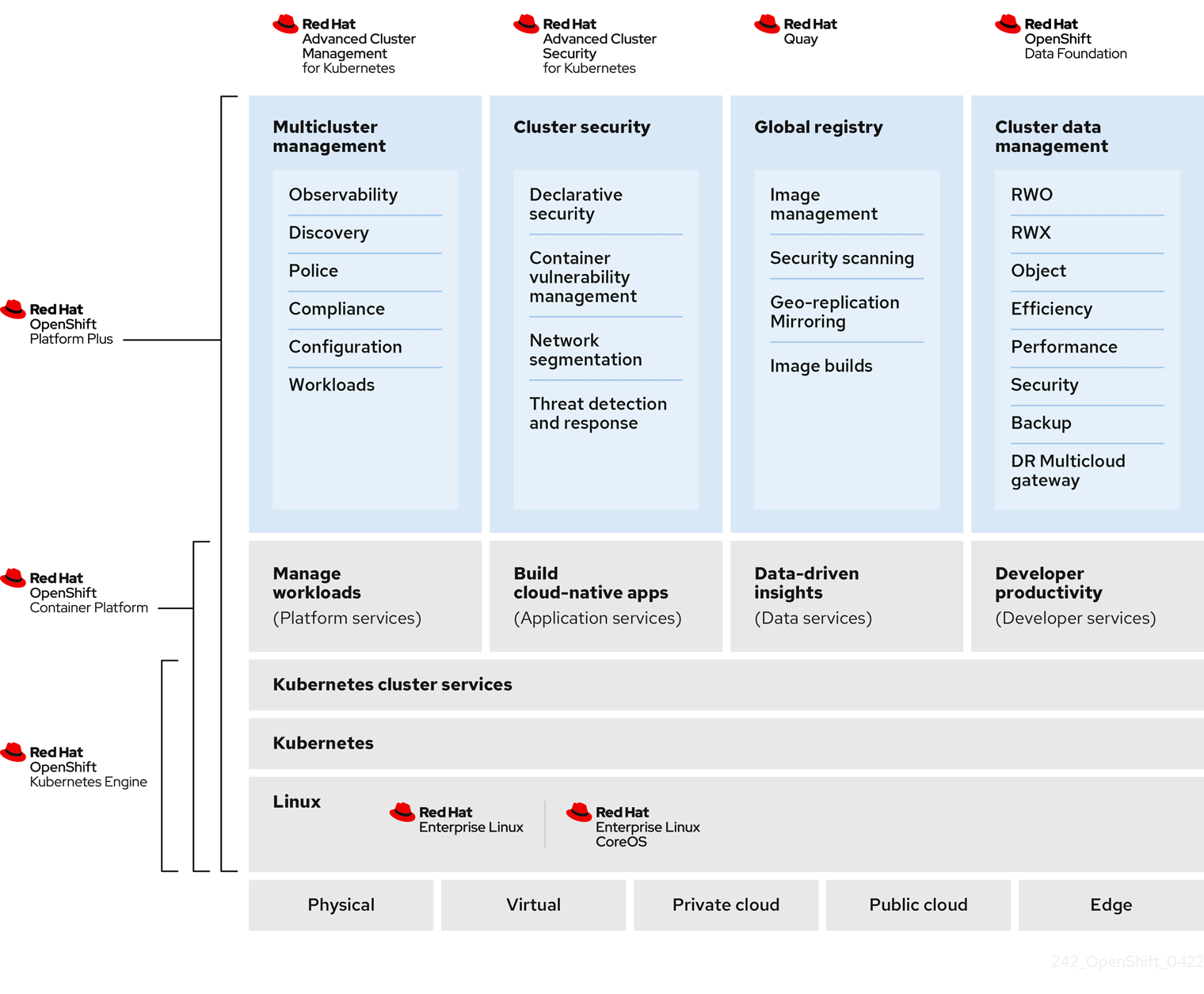Architecture
OpenShift Platform Plus architecture
Abstract
Chapter 1. OpenShift Platform Plus overview
OpenShift Platform Plus is a single hybrid-cloud platform for enterprises. Use it to build, deploy, run, and manage intelligent applications securely for multiple infrastructures. It is based on Red Hat Enterprise Linux (RHEL), Kubernetes, and Red Hat OpenShift Container Platform and includes the following products:
- Red Hat Advanced Cluster Management for Kubernetes - Controls clusters and applications from a single console.
- Red Hat Advanced Cluster Security for Kubernetes - Provides information about cluster security, visibility management, and security compliance.
- Red Hat Quay - Stores, builds, and deploys container images.
- Red Hat OpenShift Data Foundation Essentials - Provides a permanent place for data storage when clusters start and stop for multiple environments.
1.1. OpenShift Platform Plus description and architecture
OpenShift Platform Plus builds on the capabilities of OpenShift Container Platform with the following features:
- Multi-cluster security
- Complete management capabilities
- Integrated data management
- A global container registry
OpenShift Platform Plus protects and manages applications for open hybrid cloud environments and application lifecycles.

OpenShift Platform Plus supports these additional capabilities:
Platform services
- Service mesh, serverless
- Builds, CI/CD pipelines
- GitOps, Distributed tracing
- Log management
- Cost management
- Vulnerability management
- Compliance
Application services
- Languages and runtimes
- API management
- Integration
- Messaging
- Process automation
Data services
- Databases and cache
- Data ingest and preparation
- Data analytics
- AI/ML
Developer services
- Developer CLI/IDE
- Plug-ins and extensions
- Red Hat OpenShift Dev Spaces
- Red Hat OpenShift Local
1.2. Install OpenShift Platform Plus products
To install OpenShift Platform Plus, you must install OpenShift Container Platform followed by Red Hat Advanced Cluster Management. Install the additional products by applying the Red Hat Advanced Cluster Management policy sets: Red Hat Quay, Red Hat OpenShift Data Foundation Essentials, and Red Hat Advanced Cluster Security.
See the Red Hat OpenShift Platform Plus policy set for detailed information about installing the products.
Additional resources
1.2.1. Installing OpenShift Platform Plus by using policy sets
The OpenShift Container Platform installation uses two policy sets to install additional products.
Edit the policyGenerator.yaml file to remove any products that you do not want to install. You can delete the product entries or comment out the lines.
To install the policy sets using gitops, follow the steps in Deploying policies using gitops. Use the actual path to the policy set instead of the path in the example path policygenerator/policy-sets/stable/openshift-plus.
Use the following procedure to install the policy sets by using CLI:
Procedure
-
Install the
PolicyGeneratorplugin by following the instructions in Installing and using the PolicyGenerator Kustomize plug-in. Clone the
policy-collectionrepository:$ git clone https://github.com/stolostron/policy-collection
Navigate to the policy set directory:
$ cd policy-collection/policygenerator/policy-sets/stable/openshift-plus
Generate and apply the policies by using the following command:
$ kustomize build --enable-alpha-plugins | oc apply -f -
The policy sets install the remaining products on the OpenShift Container Platform cluster.
1.3. OpenShift Platform Plus product release notes
The release note information for each product is accessible from the following list:
1.4. OpenShift Platform Plus product release compatibility matrix
OpenShift Platform Plus is based on OpenShift Container Platform 4.15. To find the verified release number for each OpenShift Platform Plus product, see the following information:
| Red Hat Advanced Cluster Management | Red Hat Advanced Cluster Security | Red Hat Quay | Red Hat OpenShift Data Foundation Essentials |
| 2.10 | 4.4 | 3.11 | 4.15 |
1.5. Get support for OpenShift Platform Plus
Red Hat offers cluster administrator tools for gathering data, monitoring, and troubleshooting your cluster.
If you need help with your OpenShift Platform Plus solution, log a case in the appropriate product by using its subscription name. See the Red Hat customer support portal to open a support case.

